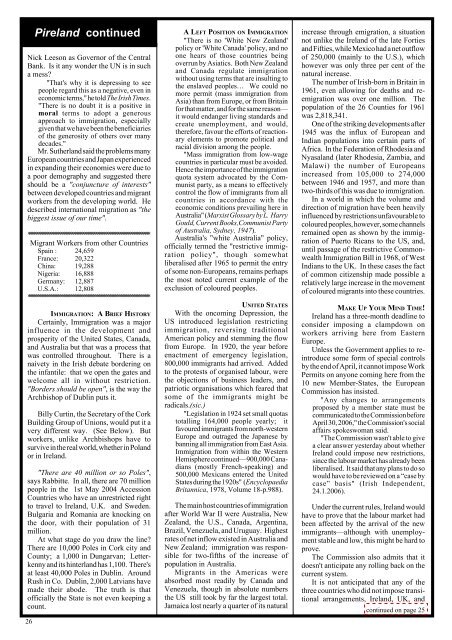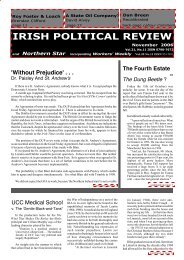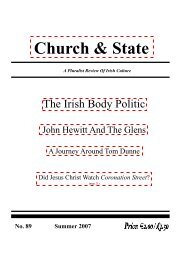Irish Political Review, March 2006 - Athol Books
Irish Political Review, March 2006 - Athol Books
Irish Political Review, March 2006 - Athol Books
Create successful ePaper yourself
Turn your PDF publications into a flip-book with our unique Google optimized e-Paper software.
26<br />
Pireland continued<br />
Nick Leeson as Governor of the Central<br />
Bank. Is it any wonder the UN is in such<br />
a mess?<br />
"That's why it is depressing to see<br />
people regard this as a negative, even in<br />
economic terms," he told The <strong>Irish</strong> Times.<br />
"There is no doubt it is a positive in<br />
moral terms to adopt a generous<br />
approach to immigration, especially<br />
given that we have been the beneficiaries<br />
of the generosity of others over many<br />
decades."<br />
Mr. Sutherland said the problems many<br />
European countries and Japan experienced<br />
in expanding their economies were due to<br />
a poor demography and suggested there<br />
should be a "conjuncture of interests"<br />
between developed countries and migrant<br />
workers from the developing world. He<br />
described international migration as "the<br />
biggest issue of our time".<br />
*********************************<br />
Migrant Workers from other Countries<br />
Spain : 24,659<br />
France: 20,322<br />
China: 19,288<br />
Nigeria: 16,888<br />
Germany: 12,887<br />
U.S.A.: 12,808<br />
*********************************<br />
IMMIGRATION: A BRIEF HISTORY<br />
Certainly, Immigration was a major<br />
influence in the development and<br />
prosperity of the United States, Canada,<br />
and Australia but that was a process that<br />
was controlled throughout. There is a<br />
naivety in the <strong>Irish</strong> debate bordering on<br />
the infantile: that we open the gates and<br />
welcome all in without restriction.<br />
"Borders should be open", is the way the<br />
Archbishop of Dublin puts it.<br />
Billy Curtin, the Secretary of the Cork<br />
Building Group of Unions, would put it a<br />
very different way. (See Below). But<br />
workers, unlike Archbishops have to<br />
survive in the real world, whether in Poland<br />
or in Ireland.<br />
"There are 40 million or so Poles",<br />
says Rabbitte. In all, there are 70 million<br />
people in the 1st May 2004 Accession<br />
Countries who have an unrestricted right<br />
to travel to Ireland, U.K. and Sweden.<br />
Bulgaria and Romania are knocking on<br />
the door, with their population of 31<br />
million.<br />
At what stage do you draw the line?<br />
There are 10,000 Poles in Cork city and<br />
County; a 1,000 in Dungarvan; Letterkenny<br />
and its hinterland has 1,100. There's<br />
at least 40,000 Poles in Dublin. Around<br />
Rush in Co. Dublin, 2,000 Latvians have<br />
made their abode. The truth is that<br />
officially the State is not even keeping a<br />
count.<br />
A LEFT POSITION ON IMMIGRATION<br />
"There is no 'White New Zealand'<br />
policy or 'White Canada' policy, and no<br />
one hears of those countries being<br />
overrun by Asiatics. Both New Zealand<br />
and Canada regulate immigration<br />
without using terms that are insulting to<br />
the enslaved peoples… We could no<br />
more permit (mass immigration from<br />
Asia) than from Europe, or from Britain<br />
for that matter, and for the same reason—<br />
it would endanger living standards and<br />
create unemployment, and would,<br />
therefore, favour the efforts of reactionary<br />
elements to promote political and<br />
racial division among the people.<br />
"Mass immigration from low-wage<br />
countries in particular must be avoided.<br />
Hence the importance of the immigration<br />
quota system advocated by the Communist<br />
party, as a means to effectively<br />
control the flow of immigrants from all<br />
countries in accordance with the<br />
economic conditions prevailing here in<br />
Australia" (Marxist Glossary by L. Harry<br />
Gould, Current <strong>Books</strong>,Communist Party<br />
of Australia, Sydney, 1947).<br />
Australia's "white Australia" policy,<br />
officially termed the "restrictive immigration<br />
policy", though somewhat<br />
liberalised after 1965 to permit the entry<br />
of some non-Europeans, remains perhaps<br />
the most noted current example of the<br />
exclusion of coloured peoples.<br />
UNITED STATES<br />
With the oncoming Depression, the<br />
US introduced legislation restricting<br />
immigration, reversing traditional<br />
American policy and stemming the flow<br />
from Europe. In 1920, the year before<br />
enactment of emergency legislation,<br />
800,000 immigrants had arrived. Added<br />
to the protests of organised labour, were<br />
the objections of business leaders, and<br />
patriotic organisations which feared that<br />
some of the immigrants might be<br />
radicals.(sic.)<br />
"Legislation in 1924 set small quotas<br />
totalling 164,000 people yearly; it<br />
favoured immigrants from north-western<br />
Europe and outraged the Japanese by<br />
banning all immigration from East Asia.<br />
Immigration from within the Western<br />
Hemisphere continued—900,000 Canadians<br />
(mostly French-speaking) and<br />
500,000 Mexicans entered the United<br />
States during the 1920s" (Encyclopaedia<br />
Britannica, 1978, Volume 18-p.988).<br />
The main host countries of immigration<br />
after World War II were Australia, New<br />
Zealand, the U.S., Canada, Argentina,<br />
Brazil, Venezuela, and Uruguay. Highest<br />
rates of net inflow existed in Australia and<br />
New Zealand; immigration was responsible<br />
for two-fifths of the increase of<br />
population in Australia.<br />
Migrants in the Americas were<br />
absorbed most readily by Canada and<br />
Venezuela, though in absolute numbers<br />
the US still took by far the largest total.<br />
Jamaica lost nearly a quarter of its natural<br />
increase through emigration, a situation<br />
not unlike the Ireland of the late Forties<br />
and Fifties, while Mexico had a net outflow<br />
of 250,000 (mainly to the U.S.), which<br />
however was only three per cent of the<br />
natural increase.<br />
The number of <strong>Irish</strong>-born in Britain in<br />
1961, even allowing for deaths and reemigration<br />
was over one million. The<br />
population of the 26 Counties for 1961<br />
was 2,818,341.<br />
One of the striking developments after<br />
1945 was the influx of European and<br />
Indian populations into certain parts of<br />
Africa. In the Federation of Rhodesia and<br />
Nyasaland (later Rhodesia, Zambia, and<br />
Malawi) the number of Europeans<br />
increased from 105,000 to 274,000<br />
between 1946 and 1957, and more than<br />
two-thirds of this was due to immigration.<br />
In a world in which the volume and<br />
direction of migration have been heavily<br />
influenced by restrictions unfavourable to<br />
coloured peoples, however, some channels<br />
remained open as shown by the immigration<br />
of Puerto Ricans to the US, and,<br />
until passage of the restrictive Commonwealth<br />
Immigration Bill in 1968, of West<br />
Indians to the UK. In these cases the fact<br />
of common citizenship made possible a<br />
relatively large increase in the movement<br />
of coloured migrants into these countries.<br />
MAKE UP YOUR MIND TIME!<br />
Ireland has a three-month deadline to<br />
consider imposing a clampdown on<br />
workers arriving here from Eastern<br />
Europe.<br />
Unless the Government applies to reintroduce<br />
some form of special controls<br />
by the end of April, it cannot impose Work<br />
Permits on anyone coming here from the<br />
10 new Member-States, the European<br />
Commission has insisted.<br />
"Any changes to arrangements<br />
proposed by a member state must be<br />
communicated to the Commission before<br />
April 30, <strong>2006</strong>," the Commission's social<br />
affairs spokeswoman said.<br />
"The Commission wasn't able to give<br />
a clear answer yesterday about whether<br />
Ireland could impose new restrictions,<br />
since the labour market has already been<br />
liberalised. It said that any plans to do so<br />
would have to be reviewed on a “case by<br />
case” basis" (<strong>Irish</strong> Independent,<br />
24.1.<strong>2006</strong>).<br />
Under the current rules, Ireland would<br />
have to prove that the labour market had<br />
been affected by the arrival of the new<br />
immigrants—although with unemployment<br />
stable and low, this might be hard to<br />
prove.<br />
The Commission also admits that it<br />
doesn't anticipate any rolling back on the<br />
current system.<br />
It is not anticipated that any of the<br />
three countries who did not impose transitional<br />
arrangements, Ireland, UK, and<br />
continued on page 25




